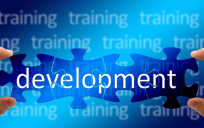Many of us are antsy to see our futures before they happen. Haven’t we all been tempted to have our palms read or consult a crystal ball reader? In government, thankfully, such adventures are unnecessary, as we have qualified experts who can make predictions for the coming years.
William Eggers, Director for Public Sector Research at Deloitte, shared with Christopher Dorobek, host of the podcast DorobekINSIDER, his take on what’s brewing for the public sector in the year 2020. Yesterday, we covered what Eggers thinks the next five years will bring for the citizen in their engagement with the government. Today, we’ll explore how the government will change internally.
First of all, technological innovation will emerge as a driving force behind government. Eggers predicted that there will be no stagnation or flattening in the upward trend of developing innovative technologies.
“We live in a world of exponential change with digital technology… Digital technologies are not leveling off. They keep getting faster and better,” Eggers said.
He said that existent breakthroughs such as Bitcoin and the Internet of Things are currently gathering momentum, and by the year 2020 they will be truly prolific. People should keep their eyes open to see how the government will respond and adapt to monumental changes such as these.
Additionally, according to Eggers, the government will start working more and more with the private sector to encourage and foster the implementation of these technological innovations in departments such as 18F. The government’s role in dealing with private innovators will be less along the lines of disciplinarian, and more along the lines of partner, collaborator, and beneficiary.
“Governments need to increasingly look at organizations like Uber, Lyft, Zipcar, Recycle Bank, or all these other organizations that are looking at solving customer problems that traditionally might have been the purview of government,” Eggers shared. “Rather than saying, how do we regulate them out of the business, or compete against them, [the government will] say, how can we leverage them for a greater public value? How do we leverage that innovation?”
Surprisingly, these changes don’t have to be seen as controversial, and they don’t have to get stuck in Congress, never to come to life. Rather, according to Eggers, these changes warrant support on both sides of the party lines, even if they at first glance look left- or right- leaning. When we hear the terms market-oriented, pay for success, open data, open government or procurement reform, we have certain associations with politics and disagreement in Congress, but that’s really not the case.
“In a lot of these areas, there’s a huge amount of bipartisan consensus,” Eggers explained. “Where you need things like more adaptive role taking and rulemaking, a more open functionality, a government that’s more dynamic and uses applied learning, continually looking at past failure and iteration, there’s nothing partisan about any of that.”
Technology will continue to transform the government and our everyday lives in new and exciting ways. Eggers has spoken on what he sees brewing for government in 2020. Are his predictions correct? Only time (or maybe a trip to the local tarot card-reading gypsy) will tell.





Leave a Reply
You must be logged in to post a comment.